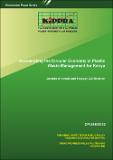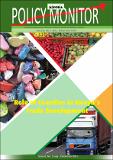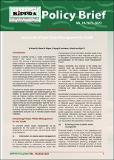Policy Brief No. 15 of 2022-2023 on Embracing Plastic Circularity as an Alternative Policy to the Ban on Single use of Plastics
Publication Date
2022Author
Type
KIPPRA Publicationsviews
downloads
Metadata
Show full item recordBy
Ibrahim, Hassan Ali, & Jecinta Anomat
Abstract/
Plastic products are by nature universal, light, cheap, and prone to indiscriminate disposal after use. The single use of plastics and improper disposal mechanisms lead to increased plastics pollution, which is a challenge to waste management. Plastics take longer to degrade and decompose and that means they keep accumulating in the environment. Other plastics that contain chemicals leak into the soil, thus degrading its value. Countries around the world are shifting from the traditional disposal of solid waste in landfill to a more sustainable waste management model. This sustainable solution involves the paradigm shift from taking the raw materials from the environment, making the product, using, and final disposal to a more closed-loop circularity model where a product is used repeatedly. Kenya banned the use of plastics (polythene) in 2017 and, subsequently, this was extended to other plastic products (polyethylene terephthalate) bottles in 2019 vide Gazette Notice 4858 in Karura forest, the National reserves, and Game parks to protect the environment and conserve nature. The ban was supposed to solve this problem and at the same time ensure adherence to the constitutional requirement of providing a clean and safe environment to Kenyans as obligated by Article 69.
Subject/
Plastic Circularity; Plastics; Plastic Products; Environmental Pollution; Green Economy.
Publisher
The Kenya Institute for Public Policy Research and Analysis (KIPPRA)Series
PB/15/2022-2023Collections
- Policy Briefs [161]
Related items
Showing items related by title, author, creator and subject.
-
Discussion Paper No 288 of 2022 on Accelerating the Circular Economy in Plastic Waste Management for Kenya
Anomat, Jecinta & Ibrahim, Hassan Ali (The Kenya Institute for Public Policy Research and Analysis (KIPPRA), 2022)The transition to a circular economy has gained global momentum, and Kenya is starting to embrace this concept, led by the private sector and government policy frameworks. Plastic waste poses a significant environmental ... -
Policy Monitor, Issue 6 No. 2, July-December 2015 on Role of Counties in Kenya's Trade Development
; Kenya Institute for Public Policy Research and Analysis (KIPPRA) (The Kenya Institute for Public Policy Research and Analysis (KIPPRA), 2015)The lead article in this issue of the Policy Monitor discusses the dynamics of trade, especially in the new constitutional dispensation that saw the creation of counties. Being a critical factor in the country’s economic ... -
Policy Brief No. 10 of 2022-2023 on Sustainable Plastic Waste Management for Youth
Koech, B,; Maina, M,; Migwa, D, & Ngugi, R. (The Kenya Institute for Public Policy Research and Analysis (KIPPRA), 2022)Kenya is currently facing a youth unemployment problem with about 11.8 million unemployed youths. The country is also facing increased plastic waste pollution, presenting an opportunity for youth employment in plastic ...




